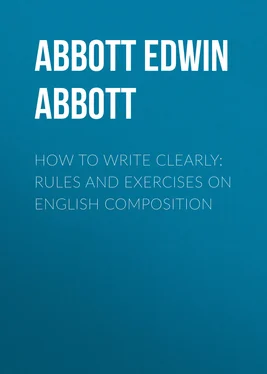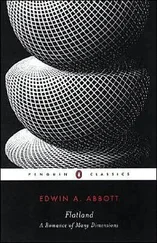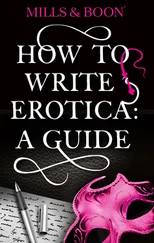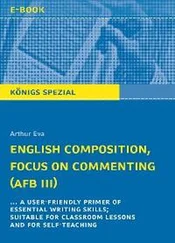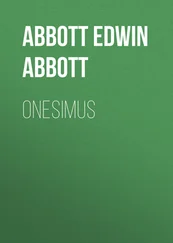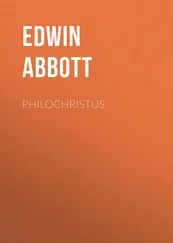Edwin Abbott - How to Write Clearly - Rules and Exercises on English Composition
Здесь есть возможность читать онлайн «Edwin Abbott - How to Write Clearly - Rules and Exercises on English Composition» — ознакомительный отрывок электронной книги совершенно бесплатно, а после прочтения отрывка купить полную версию. В некоторых случаях можно слушать аудио, скачать через торрент в формате fb2 и присутствует краткое содержание. Жанр: foreign_antique, foreign_language, foreign_edu, на английском языке. Описание произведения, (предисловие) а так же отзывы посетителей доступны на портале библиотеки ЛибКат.
- Название:How to Write Clearly: Rules and Exercises on English Composition
- Автор:
- Жанр:
- Год:неизвестен
- ISBN:нет данных
- Рейтинг книги:4 / 5. Голосов: 1
-
Избранное:Добавить в избранное
- Отзывы:
-
Ваша оценка:
- 80
- 1
- 2
- 3
- 4
- 5
How to Write Clearly: Rules and Exercises on English Composition: краткое содержание, описание и аннотация
Предлагаем к чтению аннотацию, описание, краткое содержание или предисловие (зависит от того, что написал сам автор книги «How to Write Clearly: Rules and Exercises on English Composition»). Если вы не нашли необходимую информацию о книге — напишите в комментариях, мы постараемся отыскать её.
How to Write Clearly: Rules and Exercises on English Composition — читать онлайн ознакомительный отрывок
Ниже представлен текст книги, разбитый по страницам. Система сохранения места последней прочитанной страницы, позволяет с удобством читать онлайн бесплатно книгу «How to Write Clearly: Rules and Exercises on English Composition», без необходимости каждый раз заново искать на чём Вы остановились. Поставьте закладку, и сможете в любой момент перейти на страницу, на которой закончили чтение.
Интервал:
Закладка:
*17. The object is sometimes placed before the verb for emphasis.* This is most common in antithesis. " Jesus I know, and Paul I know; but who are ye?" " Some he imprisoned, others he put to death."
Even where there is no antithesis the inversion is not uncommon:
"Military courage , the boast of the sottish German, of the frivolous and prating Frenchman, of the romantic and arrogant Spaniard, he neither possesses nor values."
This inversion sometimes creates ambiguity in poetry, e.g. "The son the father slew," and must be sparingly used in prose.
Sometimes the position of a word may be considered appropriate by some, and inappropriate by others, according to different interpretations of the sentence. Take as an example, "Early in the morning the nobles and gentlemen who attended on the king assembled in the great hall of the castle; and here they began to talk of what a dreadful storm it had been the night before. But Macbeth could scarcely understand what they said, for he was thinking of something worse." The last sentence has been amended by Professor Bain into " What they said , Macbeth could scarcely understand." But there appears to be an antithesis between the guiltless nobles who can think about the weather, and the guilty Macbeth who cannot. Hence, "what they said" ought not, and "Macbeth" ought, to be emphasized: and therefore "Macbeth" ought to be retained at the beginning of the sentence.
The same author alters, "The praise of judgment Virgil has justly contested with him, but his invention remains yet unrivalled," into "Virgil has justly contested with him the praise of judgment, but no one has yet rivalled his invention"—an alteration which does not seem to emphasize sufficiently the antithesis between what had been 'contested,' on the one hand, and what remained as yet 'unrivalled' on the other.
More judiciously Professor Bain alters, "He that tells a lie is not sensible how great a task he undertakes; for he must be forced to invent twenty more to maintain one," into "for, to maintain one, he must invent twenty more," putting the emphatic words in their emphatic place, at the end.
*18. Where several words are emphatic, make it clear which is the most emphatic.* Thus, in "The state was made, under the pretence of serving it, in reality the prize of their contention to each of these opposite parties," it is unpleasantly doubtful whether the writer means (1) state or (2) parties to be emphatic.
If (1), "As for the state , these two parties, under the pretence of serving it, converted it into a prize for their contention." If (2), write, "Though served in profession, the state was in reality converted into a prize for their contention by these two parties ." In (1) parties is subordinated, in (2) state .
Sometimes the addition of some intensifying word serves to emphasize. Thus, instead of "To effect this they used all devices," we can write "To effect this they used every conceivable device ." So, if we want to emphasize fidelity in "The business will task your skill and fidelity," we can write "Not only your skill but also your fidelity." This, however, sometimes leads to exaggerations. See (2).
Sometimes antithesis gives emphasis, as in "You do not know this, but you shall know it." Where antithesis cannot be used, the emphasis must be expressed by turning the sentence, as "I will make you know it," or by some addition, as "You shall hereafter know it."
*19. Words should be as near as possible to the words with which they are grammatically connected.* See Paragraphs 20 to 29. For exceptions see 30.
*20. Adverbs should be placed next to the words they are intended to affect.* When unemphatic, adverbs come between the subject and the verb, or, if the tense is compound, between the parts of the compound tense: "He quickly left the room;" "He has quickly left the room;" but, when emphatic, after the verb: "He left, or has left, the room quickly ." 10 10 Sometimes the emphatic Adverb comes at the beginning, and causes the transposition of an Auxiliary Verb, " Gladly do I consent."
When such a sentence as the latter is followed by a present participle, there arises ambiguity. "I told him to go slowly, but he left the room quickly , dropping the purse on the floor." Does quickly here modify left or dropping ? The remedy 11 11 Of course punctuation will remove the ambiguity; but it is better to express oneself clearly, as far as possible, independently of punctuation.
is, to give the adverb its unemphatic place, "He quickly left the room, dropping &c.," or else to avoid the participle, thus: "He quickly dropped the purse and left the room," or "He dropped the purse and quickly left the room."
*21. "Only" requires careful use. The strict 12 12 Professor Bain.
rule is, that "only" should be placed before the word affected by it.*
The following is ambiguous:
"The heavens are not open to the faithful only at intervals."
The best rule is to avoid placing "only" between two emphatic words, and to avoid using "only" where "alone" can be used instead.
In strictness perhaps the three following sentences:
(1) He only beat three,
(2) He beat only three,
(3) He beat three only , ought to be explained, severally, thus:
(1) He did no more than beat, did not kill, three.
(2) He beat no more than three.
(3) He beat three, and that was all he did. (Here only modifies the whole of the sentence and depreciates the action.)
But the best authors sometimes transpose the word. "He only lived" ought to mean "he did not die or make any great sacrifice;" but "He only lived but till he was a man" ( Macbeth , v. 8. 40) means "He lived only till he was a man." Compare also, "Who only hath immortality."
Only at the beginning of a statement = but . "I don't like to importune you, only I know you'll forgive me." Before an imperative it diminishes the favour asked: " Only listen to me." This use of only is mostly confined to letters.
Very often, only at the beginning of a sentence is used for alone : " Only ten came," " Only Cæsar approved." Alone is less ambiguous. The ambiguity of only is illustrated by such a sentence as, "Don't hesitate to bring a few friends of yours to shoot on my estate at any time. Only five (fifteen) came yesterday," which might mean, "I don't mind a few ; only don't bring so many as fifteen ;" or else "Don't hesitate to bring a few more ; no more than five came yesterday." In conversation, ambiguity is prevented by emphasis; but in a letter, only thus used might cause unfortunate mistakes. Write "Yesterday only five came," if you mean "no more than five."
*22. When "not only" precedes "but also," see that each is followed by the same part of speech.*
"He not only gave me advice but also help" is wrong. Write "He gave me, not only advice, but also help." On the other hand, "He not only gave me a grammar, but also lent me a dictionary," is right. Take an instance. "He spoke not only forcibly but also tastefully (adverbs), and this too, not only before a small audience, but also in (prepositions) a large public meeting, and his speeches were not only successful, but also (adjective) worthy of success."
Читать дальшеИнтервал:
Закладка:
Похожие книги на «How to Write Clearly: Rules and Exercises on English Composition»
Представляем Вашему вниманию похожие книги на «How to Write Clearly: Rules and Exercises on English Composition» списком для выбора. Мы отобрали схожую по названию и смыслу литературу в надежде предоставить читателям больше вариантов отыскать новые, интересные, ещё непрочитанные произведения.
Обсуждение, отзывы о книге «How to Write Clearly: Rules and Exercises on English Composition» и просто собственные мнения читателей. Оставьте ваши комментарии, напишите, что Вы думаете о произведении, его смысле или главных героях. Укажите что конкретно понравилось, а что нет, и почему Вы так считаете.
